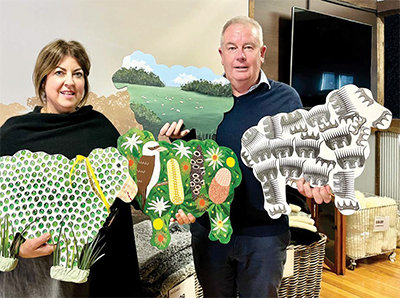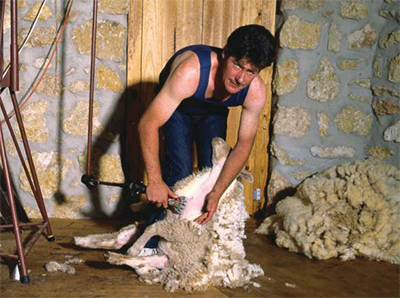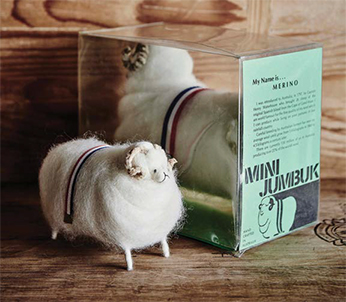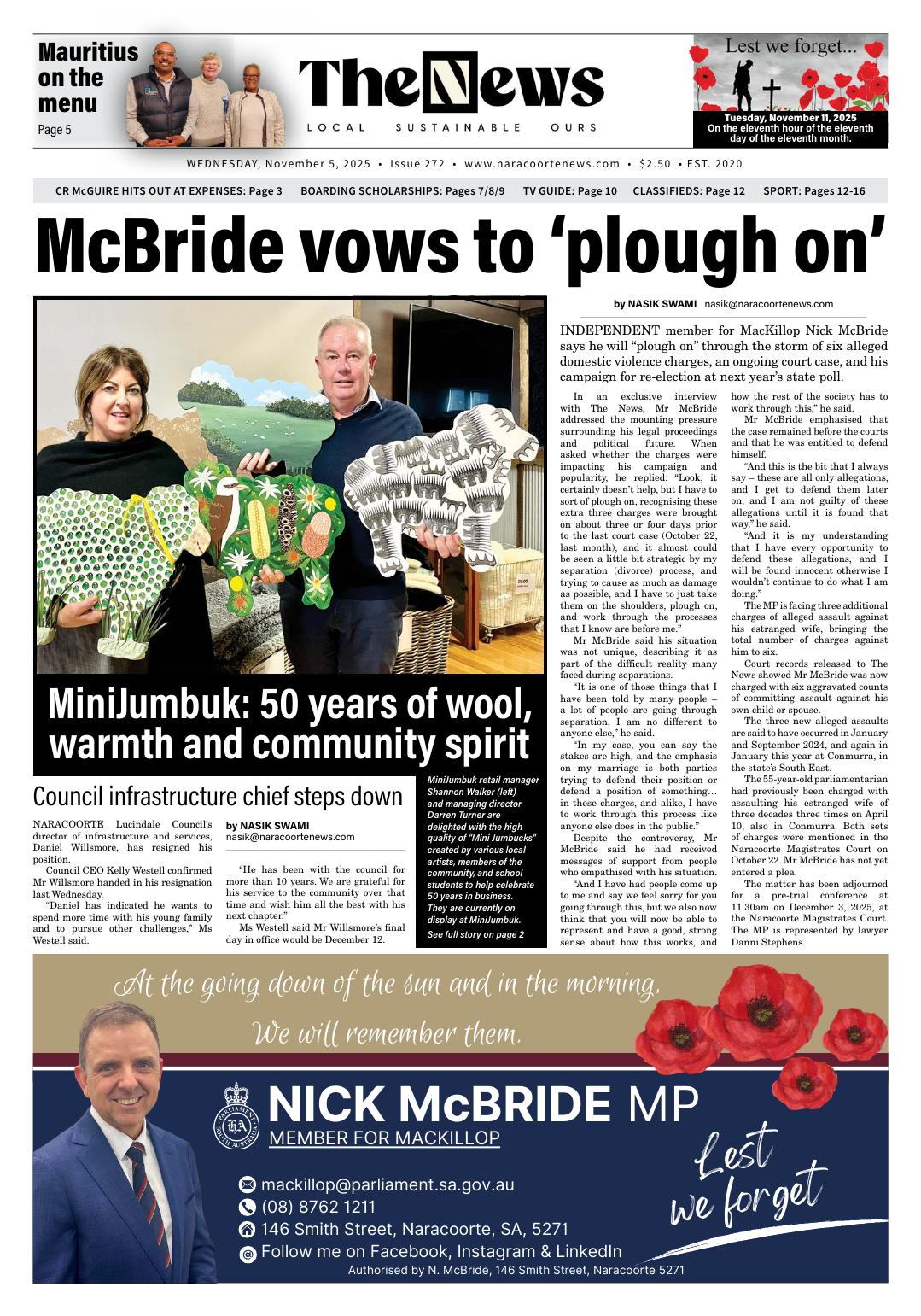Naracoorte’s much-loved woollen bedding manufacturer, MiniJumbuk, is celebrating an extraordinary milestone — 50 years in business.
From humble beginnings, the woollen bedding company’s story is woven with innovation, resilience, and an enduring connection to our community.
With a $30 million annual turnover, no debt, 70 employees, and a new expansion underway in Naracoorte, executive director and shareholder Darren Turner believes the company’s future is every bit as bright as its past.
“I hope one day to be invited back for our 75th anniversary,” he said.
From souvenir sheep to a sleep revolution
MiniJumbuk’s story began in 1975, when Isobel Miles, a rural woman from a sheep and beef farm in Hynam, began handcrafting miniature sheep from local wool, some wooden rods, and pipe cleaners.
She sold them from her kiosk at the Naracoorte Caves, delighting tourists and locals alike.
Her neighbour, Don Wray, a young shearer sidelined by a back injury, soon joined in.
Told by doctors he’d be in a wheelchair by 40 if he continued shearing, Mr Wray poured his energy into something new and was soon exploring wool’s untapped potential.
By 1978, he had created something the world had never seen: the first-ever woollen quilt.
It was an era when people were transitioning from woollen blankets for bedding to quilts made of down feathers from Europe, or polyester from elsewhere.
His creation was set to change the bedding industry forever.
A leap of faith and a Melbourne breakthrough
By 1980, MiniJumbuk had moved into Naracoorte from Hynam, and a young Darren Turner had bought his first woollen cot quilt.
Within three years, Mr Wray had purchased the business outright with the help of family and hired Mr Turner — a friendship forged through the local Apex Club.
“When I joined, MiniJumbuk was in its third year of a contract to make quilts for Onkaparinga,” Mr Turner said.
“They had decided not to renew the contract, but we had a year to run.
“Don and his team had developed this under blanket, a two-layer wool filled under blanket, a sensational product that was going to be branded by Onkaparinga and sold to Myer (department store).
“But now, Onkaparinga weren’t going ahead with it.
“So, three weeks after I joined, Don had booked a small booth at a textile trade show in Melbourne where we had a display of the Onkaparinga quilts.
“But we also showed this new under blanket under our own brand, and we just made our own luck.
“We were surrounded by the commission agents that Onkaparinga had. They said, ‘Gee we like this product, can we be your agent?’
“So, on the first day we picked up a national sales team and they helped us with the pricing and the rebates to get that right.
“By the afternoon of the second day, they were bringing national customers to us.
“So, we opened a business in the period of 48 hours with the national sales team and retailers from Queensland, New South Wales, and Melbourne.”
And so began MiniJumbuk as a nationally acclaimed luxurious woollen bedding company.
Because the under blanket could be sold as their own product, it was outselling the quilt by 20 to one.
With no further ties to Onkaparinga, the following year, MiniJumbuk launched its quilts under its own brand and began manufacturing more quilts as well as large volumes of underblankets.
“We got a really large contract through one of the agents for New South Wales (the retailer) was called JB Young’s, that was later bought out by Grace Brothers, which became Myer Grace Brothers,” Mr Turner said.
“So, we picked up a large retailer, and we spent six months building this order, and we grew the business over the next two or three years, to the point where the business had gone from producing a relatively low number of products to hundreds of thousands of products including the still very popular MiniJumbuk souvenir sheep.
A lot of hard work to build up sales was put in, and there were plenty of challenges, especially during the late 80’s and early 90’s.
But together they pushed through, building the company and brand as well as opening their retail shop on weekends.
From the country to the city
One of the early turning points for the company while it was building was during the mid-1980s.
“I talk about you make your own luck. But the agency that was doing all the work for the Australian Woolmark Company in Melbourne actually said to the Woolmark company, `hey, this company does woollen bedding, souvenir sheep promoting wool… you should be giving them something as a recognition considering they had just won the Australian Small Business of the Year!”
MiniJumbuk was gifted $5,000 worth of agency time with a marketing business and proprietor who was passionate about the qualities of wool.
“He helped us establish a wider range, which I call the Sleep System,” Mr Turner said.
Pillows were made, and so were woollen pillow covers.
“So we had what’s called the whole bed solution with wool.”
For the next decade, the company kept building and growing, with Mr Turner picking up the Myer account.
“I was pretty pleased with that. I remember coming home once from Melbourne after having a half day meeting with Myer with basically a million-dollar order for the following year that we were going to do.
“It was pretty, sort of exciting. We grew the business by then developing our story.
“It was Don’s idea that we take the country to the city. We had these new products in Myer, but we didn’t know how we’d sell it to the end customer.”
They decided to do a training night with Myer staff, and Mr Wray said he would shear a sheep, and Mr Turner “could do the talking”.
“So we went to Melbourne. We booked a venue that was a wedding venue down by the river, and invited all the staff in,” Mr Turner said.
“Don talked through his shearing, which was entertaining – no one had seen live shearing of a sheep in the city, and I talked through all the benefits of wool, and they fell in love with it, and we developed this promotion that if you bought a MiniJumbuk quilt or under blanket, you actually got a free pillow.”
To incentivise the staff, every staff member received a free pillow for every customer who got one.
“We invested in letting staff use the product, so they were able to use the product and love it, and they were able to sell with confidence,” Mr Turner said.
“So we had everything. We had a story, we had training, we had a promotion that customers would buy, and the sales staff were getting behind it.
“During the mid to late 80s, that was the beginning of us doing that sort of training for the next two decades.”
Making their own luck
Also during the early years, Mr Wray would attend not just the South East Field Days at Lucindale, but as many field days as he could.
“That was another way of building the brand direct to the customer,” Mr Turner said.
“It was a time before mobile phones and the internet “so we had to keep reinventing our story”.
For a few years they ran fashion parades in shopping centres.
“Don said let’s get a flock of rams. So, we had five different breeds, and we would say, `this is the secret herbs and spices, or the special blend that goes into MiniJumbuk,” Mr Turner said.
“We trained rams using sheep nuts to walk on a catwalk. So, the rams would walk up on a catwalk with a quilt or an under blanket draped over them, and we would talk like we were talking to a fashion parade about the benefits.”
Mr Turner said they took wool from one or two percent of the market share to about 20 or 25 percent.
“I would credit MiniJumbuk for the woollen quilts that are now sold. China sells millions of them now, but many give MiniJumbuk the credit for establishing the wool quilt as a viable alternative to feather and polyester.”
Focussed on community
Right from the start, Mr Wray was “very focussed on our local community”. Although Mr Wray died on October 25, 2023, his commitment to the community was instilled into MiniJumbuk throughout the decades, and remains today.
From the late 1980s and early 1990s, Mr Wray and Mr Turner noticed a lot of people visiting the caves from all over Australia and overseas they were coming into Naracoorte on weekends. But no shops were open for them.
MiniJumbuk began trading seven days a week, and it was another turning point that proved a profitable and successful move.
Twenty-five years on, and MiniJumbuk still opens its doors seven days a week.
“So it’s part of the DNA that the authenticity of the quality and the pride and the craftsmanship actually comes from the business being in this community for 50 years, and being a really strong supporter of the community,” Mr Turner said.
“Being here, we actually have the Naracoorte story and the fact that we buy direct from our farmers, and we’re in a wool growing area.
“If there’s a local event, like the basketball (last weekend), we know there will be a rush on, so we put extra staff on.
“It just makes sense to be open when people want you to be open.”
Award-winning growth and enduring values
MiniJumbuk’s hard work has been officially recognised many times.
But a highlight was national recognition in 2007 when it was announced Australia’s Telstra Small Business of the Year. The business was recognised nationally, reaching further levels of growth.
Adding to its success, over the last 40-50 years, Mr Turner said MiniJumbuk was still dealing with many of its original suppliers.
“So, we get consistent quality and have built good relationships with people. I think that’s been very successful too.”
The community is also involved in celebrating 50 years with various people creating their own “Mini Jumbucks”.
Retail manager Shannon Walker said each participating artist received their own Mini Jumbuk base to decorate with any medium.
A Raceway of Sheep gallery has been created at MiniJumbuk, showcasing the work of various artists.
Additionally, junior primary school students from local schools have created a further Raceway of Sheep for a display.
“It brings a smile to our face that you can do things within your community, for your community and the community can do things with you,” Mr Turner said.
“I think it makes living in country towns different, and better.”
This article appeared in The Naracoorte News, 5 November 2025.




